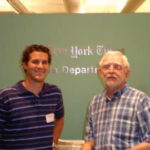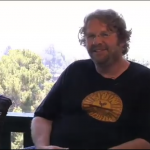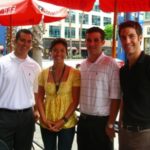Tim Katzman is the Director of Corporate Communications for the San Diego Padres, and has been with the organization for 11 years. He started off as a professor in American Studies on the East Coast and ended up being in the right place at the right time. He created a position for himself with the Padres where he reached out to fans that were disengaged with the sport as a result of the 1994 baseball strike. He is now the self-proclaimed “editorial free safety” for the ball club and claims to, “work in the toy department of life.” Given that description, he is no doubt passionate about what he does for a living.
 Tim claims that the Padres are only as good as the fans that come to the park. He has worked hard to make the ballpark experience more desirable by making ticket prices more reasonable, reaching out to the community and putting a competitive product out on the field.
Tim claims that the Padres are only as good as the fans that come to the park. He has worked hard to make the ballpark experience more desirable by making ticket prices more reasonable, reaching out to the community and putting a competitive product out on the field.
His advice to college students is to focus on writing effectively to clearly communicate the message that you are trying to get across to your audience. He advises that when writing a paper, “you need to rewrite, rewrite, rewrite, rewrite, and then give it to someone else to read it over.”
He defines luck as “when hard work meets opportunity.”
His advice to someone trying to get a job baseball is to gain experience at the minor league level. He says that this will allow you to differentiate yourself on a resume from the thousand of other applicants trying to get a job in sports. It will also give you a better idea of whether a career in sports is right for you.
Interview: How I Became Director of Corporate Communications for the San Diego Padres
I’m probably not going to be real instructive for you guys because I got into baseball in a way that, to my knowledge, nobody else I’ve ever met has gotten into it.
I was teaching at a boarding school in Connecticut. I took a sabbatical in 1994 to write an article for Sports Illustrated. I haven’t written the article yet, but nonetheless, that was my entrée (Laughs).
Because of people I’d run into I wound up working with a minor league team in Stockton. The gentleman that owned that team also owned a team up in Brisbane, Australia. So…it was really being in the right place at the right time.
Also, at that time, the Commissioner of Baseball and the Deputy Commissioner were both graduates of the prep school that I taught at. So it was more than serendipity. The nature of getting into this industry is blind, dumb luck, but it’s also essentially being in the right place at the right time.
I was in Stockton, California, then I was in Australia, and then literally, flying to Los Angeles from New Zealand. I called the gentleman who owned both of those teams and told him he should come down to San Diego so we can have lunch and discuss why his team was losing so much money in Australia.
As it turned out he came down here and we met at this fairly swanky tennis club. His doubles partner was the President of the Padres. So, it really was being in the right place at the right time.
The next day I got a call saying that I was writing this article for Sports Illustrated, how would you like to come back and help us out. We’re in the midst of some gigantic changes here with the Padres.
So I came back, I spent the summer creating a position that really didn’t exist. Which was reaching out to fans that were either disengaged, dispossessed, or disenfranchised by the game because of the strike.
Because of the strike, baseball was not the first place people like for fun and enjoyment. Especially in San Diego, because we had a crap team and there had been a fire sale. There was a long, negative legacy into which I walked into.
I went back and taught for a year and then, essentially, got an offer I couldn’t refuse. So I came back out here and now I’m the Director of Corporate Communications for the San Diego Padres.
In terms of forming a template, I wouldn’t suggest that people go the route that I went. Probably because it’s not going to happen. But everyone has a different kind of story, either anecdotal, or just right down the middle that allowed them to get to a position in the baseball world.
So, here I am. I don’t know if that’s helpful or not.
I played amateur baseball up until three years ago.
When I joined the single A team in Stockton that is affiliated with the Brewers, the previous year they won the Cal League championship. When I got there they finished dead last. I flew to Australia and hooked up with the Brisbane Bandits that won the league championship the year before I got there and when I arrived they finished dead last. I showed up in San Diego and this team already was dead last.
So the article I was going to write was off of Charles Dickens “Worst of Times, Best of Times,” kind of the tale of three cities. But it didn’t happen, and I don’t think Sports Illustrated is waiting for it any longer at this point.
It would have been about a guy in his forties takes a year off and do what most guys would like to do- fart around baseball for a year and then write for Sports Illustrated and get paid to do this sort of stuff. In the truest sense it was an adult fantasy in some ways, but never at any point did I anticipate that this school teacher would have a future in baseball.
It’s the law of unintended consequences. Sometimes it just happens.
I’ve been with the Padres for eleven years.
It always makes life easier when you win fifty more games than the previous years.
Our office is here in the ballpark right here in downtown.
No matter how crappy a day I have I’ve got a baseball game at the end of it. From one who is infused with the national pastime, I get to watch a baseball game in one of the most exquisite baseball facilities in the world. Pretty big deal.
What’s the worst part?
There’s that old saying that if you find a job you love you’ll never work a day in your life. I’m fortunate because San Diego is a pretty easy town to live in with a laid back lifestyle. The hours are sometimes long. Dealing with fans, which is a function of my primary responsibilities…fans think with their hearts, and you get a lot of comments from fans that however well intended they may feel, they sometimes get a bit tedious. But we never lose sight that without those fans, we don’t have a baseball team. Nor do we have jobs.
There was a manager that said, you better be good at baseball, because a hundred and sixty-two games is a long time to be miserable. That’s very true. When you start to scramble and you lose baseball games, it doesn’t make it quite as fun to come into the office compared to when you win 15 games in the month of May when we’re only 16 days into the month.
In this particular industry, I think that one of the most important things that we do is that we treat every fan—well, you know Nordstroms. You could have bought a pair of shoes twenty years ago and take them back. Our mantra hear is underpromise and overdeliver. That’s something that we live by every day. We realize that we’re only as good as those fans coming in the ballpark.
I don’t know if there’s a particular skill, but certainly, the ability to communicate, which is essentially my job both externally and internally. We want to make sure the message points we have are consistent, thorough, precise, and timely. That suggests an ability to write effectively and sensitive to the demographics of our town. San Diego isn’t a big town. This isn’t like Boston, New York, Philadelphia, or Atlanta. There are three or four Fortune 500 companies here in San Diego. The main thrust of our business is going to be families, individuals, small businesses, and groups. That’s really where we draw the majority of our fan base from. Also, because of the bilingual nature of this community, and in this country, it is crucial that we are able to reach out both on this side and the other side of the border.
I don’t know what skill would be the most important, but what I’ve learned is that you’re not going to win every baseball game every day. That’s not what is going to make the people very happy. But we have to find a way to continue to keep people engaged in what we’re trying to do both on the field and off the field. As long as we can do that, we’re going to keep people in the fold and we’re going to be successful.
My skill is that I write well. That’s something that is increasingly important. There’s a sense that baseball teams are a collection of dumb guys who used to play baseball with a trail of dip coming out of their mouth. Then, all of sudden, they tell themselves that they can scout or coach. That’s not really the case. We’ve got a number of people here with advanced degrees. Virtually everybody in here has one particular skill set that distinguishes him or her in such a way that that person makes themselves invaluable.
Unless I go back and there’s yellow caution tape in front of my door, and the organization continues to think that my ability to write well and communicate effectively allows me to come back and get a paycheck next week. Of course, that could change.
A lot of people, mostly men, look at me and say you’re really lucky to be in baseball. I think whatever job you have in life, no one promises or guarantees you a job. You’ve got to earn it.
But I’ve always been guided by some wisdom that my father told me: the best definition of luck is when hard work meets opportunity. I think that’s why a lot of people in baseball find themselves where they are.
The education background is a curious topic to a lot of people. Most people think I write well because I’m an academic. I write well because I’ve read a lot of crappy papers for thirty years.
I have a very high bar in terms of what’s written. Someone asked me a week ago when all the interns were here to describe my position. I borrowed a football comparison and said that I’m the editorial free safety for the club. People can write stuff and they can send it out, but ultimately someone will say, “has Tim seen it?” And I can say that I never saw it. Then it’s not my responsibility. If I have seen it, the organization expects and demands that I understand what a misplaced modifier is. Now most people don’t give a rat’s ass. Most people are less concerned about the presentation than the content. My job is to take that content and massage it, or direct it in such a way that what we send out of here is as articulate and as carefully written as it possibly can be. That’s not to say that I don’t make mistakes, because I make them every day. But I do provide that rather thin blanket of insulation for my colleagues. If they want something written they can give it to me, or if they’ve written something and they want to make sure it’s reasonable, they can also give it to me.
Were you an English teacher?
No I was not. I was an American Studies teacher.
Write lots. The number one thing is rewrite, rewrite, rewrite, rewrite, proofread, and then have someone else do it. Very few people can edit their own work. They think they can, but then they get something back with ten thousand red marks all over it. Computer screens have really made most people’s visual field numb. You cannot compose and edit on a computer screen. Very few people can. Everything I give back to people in this organization is not red lined out on a computer screen. I print out a hard copy and use a green pen for user friendliness.
I used to run the interns program here up until two years ago when it became so overwhelming that we passed it along to our HR department. I read hundreds of resumes between January and March. I would have to parcel these resumes out to the various departments based on skills. So if you thought you had great sales skills, you’d go into ticket sales. If you were bilingual, you’d go into the Latino marketing department. If you thought you had great financial skills, we might put you in our accounting department. I don’t do that anymore, and happily, frankly.
Too many people come and they want to work for a baseball team. Well that’s great. Then they say their specialty is they love to write and they love baseball. Well that’s great too. So there’s one position with the baseball team that you’re competing with a couple thousand people for.
What I always try to recommend to people, or urge, frankly, is that they broaden. They throw their net more widely upon the sea. So if someone says to you, “Well, it looks like you have some marketing skills, and there’s an opportunity to go into marketing with the lacrosse team in Baltimore, or the women’s pro bowling circuit in Akron.” They’ll say, “Well, that’s not sports.” People just have to understand that that’s not the sport that you want.
For people that want to get in the baseball industry, I’d encourage all of them to start at a minor league level. Go out and work with a single A team and cut your teeth on an inclusive experience. Because as you move up the food chain, especially in professional baseball, the jobs become more and more specialized.
It’s fair to say that there would not be somebody doing what I’m doing with the Idaho Falls Chuckers. But working at a minor league level and you’re taken out of your comfort level, perhaps you’ll be compelled to do a lot of different things. You might put on the mascot suit and make a fool out of yourself in center field. You might take tickets to people at a senior living center. You might have to write a press release. You might throw batting practice if someone’s arm wears out in August. Then you’ll really get a sense of whether something is really right or wrong for you.
Once you cut your teeth on that experience, which I think is in every possible way an educational one, then people are going to know that you’re out there. Then ultimately, you may go up.
But if your only thought is that you want to work for the Boston Bruins and live outside of Boston. Well, that’s great as long as you understand that there’s one team with one role and a significantly large number of people who are trying to get that same position.
When people ask me what industry I’m in, I say I work in the toy department of life. It’s entertainment. We’re doing the same thing that Six Flags and Sea World are doing. There’s only so much discretionary income out there. The beauty in this business, and the challenge, is that we play eighty-one times a year. We do it eighty-one times a year. We better be very prepared to keep things fresh, vibrant, and alive.
But at the end of the day, when Mr. and Mrs. Smuckworth and little Johnny and Sally say we can go to the beach, roller blading, Sea World or see the Padres. We want to make sure we can capture that family, and ensure that we are an option of affordable family entertainment. It’s absolutely crucial to us that we keep the price of the ticket within reach of a family of four. That’s so we don’t get to the point where you’re paying twenty-nine bucks for a hot dog.
It’s real simple. If you’re going to go sign Giambi and Kevin Brown and A-Rod and Derek Jeter, you better be ready to have the same GDP that the Ivory Coast does. So they’ve got a payroll of $200 million dollars. They have a payroll of about 60 something. They have a television contract of something like $140 million. We’ve got one that is $13 million. There are always going to be those discrepancies, but going out and buying free agents does not always mean that you’re going to win.
We’ve got a new ballpark. We have a team that’s low profile with not a lot of exciting guys. We’re in a small market by television standards. It’s a bicultural market. Players are looking around and saying that I can play in Detroit, or I can play in San Diego. San Diego isn’t a bad place to live, and we’ve been able to convince our players that it’s okay to live on $3-$4 million a year. A-Rod’s not going to play for us, although it’d be great to have him. But if we do that, ticket prices are going to go up to $70, $80, $90. Hamburgers and hot dogs will cost you ten bucks. It’s not going to happen in a town where we’re trying to connect with families. We don’t have the corporate accounts that a New York, Boston, Philadelphia, Atlanta, or either one of the Chicago teams does. We are a small, sleepy fishing village on the international border.
But ultimately, the best marketing tool is winning. This is not Arizona State versus University of Arizona. It’s not like you just lose and you go out and get hammered and be okay on Monday. In our environment it’s a little bit different. We need to win. We’ve got a new plan with four bases called the Padres plan. There’s the team. The community. The fans. And the ballpark. Each one of those four components are the ones that drive us. We want to have a better team. We want to have a good ballpark. We want to continue to reach out to the community through a number of programs that make us with a nice corporate conscience. And then we keep the prices within the reach of the fans. If we can hang onto those four points, we’re never going to be farther away then we want to be.






